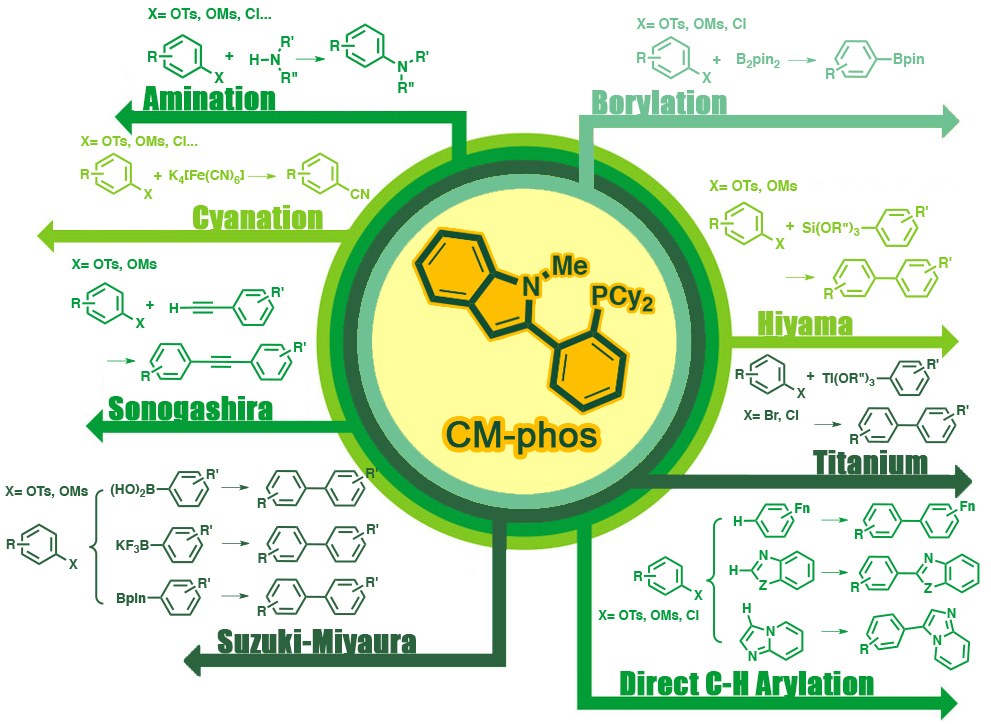Prof. Kwong works on catalysts for cross-coupling reactions, which includes the formation of aromatic bonds between carbon atoms (C-C) and other common atoms (C-X) such as nitrogen and oxygen. Prof. Kwong has expanded the methodologies for catalyst design, and in the process built a library of such catalysts, thus providing a resource which can be used by the wider academic community and industry. In particular, Prof. Kwong’s work on phosphines has reported high efficiency rates for catalysis. Apart from traditional cross-coupling reactions, Prof. Kwong is also interested in organocatalysis, C-H functionalization and asymmetric catalysis.
An interview about Prof. KWONG's research: https://projects.croucher.org.hk/news/michael-kwong-from-cartoons-to-catalyst-design
Our research group is interested in the development of ligands for catalysis, which combines techniques of organic synthesis, and organometallic chemistry for efficient catalytic transformations. It would be highly attractive and beneficial if the designed ligands can be easily prepared, conveniently diversified and systematically fine-tuned. Prof. Kwong designed several series of phosphines by simple fischer indolization with N-P, C-P, P-O and P-N type ligands. Moreover, phosphine ligands with carbazolyl and benzimidazolyl backbone were also developed.
Reviews about our phosphine ligands:
Accounts of Chemical Research, 2022, 55, 3688-3705
Coordination Chemistry Reviews, 2015, 293-294, 158-186

Prof. Kwong works on catalysts for cross-coupling reactions, which includes the formation of aromatic bonds between carbon atoms (C-C) and other common atoms (C-X) such as nitrogen and oxygen. Prof. Kwong has expanded the methodologies for catalyst design, and in the process built a library of such catalysts, thus providing a resource which can be used by the wider academic community and industry. In particular, Prof. Kwong’s work on phosphine ligands has reported high efficiency rates for catalysis. His work on palladium catalysts has also achieved excellent selectivity.
A review about cross-coupling:
Chemical Society Reviews, 2011, 40, 4963-4972
The development of environmentally benign and economically sound processes is important to organic synthesis. Direct arylation reactions via C–H bond functionalizations represent economically attractive alternatives to traditional cross-coupling reactions with organometallic reagents. The merging of organocatalysis and C-H bond functionalizations is even more attractive in pharmaceutical industries.
Prof. Kwong put his efforts in demonstrating inert C-H bond functionalization including arene C-H, C-H bonds slpha to the heteroatom such as oxygen and nitrogen with/ without transition-metal catalysts. In particular, Prof. Kwong showed a striking breakthrough to the frame of traditional cross-couplings/C−H functionalizations in 2010. They uncovered a conceptually different approach toward the biaryl syntheses by using DMEDA as the catalyst to promote the direct C−H arylation of unactivated benzene in the presence of particular bases. This finding offers an option toward establishing a new horizon for direct C−H/cross-coupling reactions.
A review about Transition-Metal Free Aromatic C-C Bond Formation: Chemistry - A European Journal, 2013, 19, 15802-15814
Reviews about Cross-Dehydrogenative Functionalization of C(sp2)-H Bonds: Chemistry - An Asian Journal, 2014, 9, 26-47; Organic Chemistry Frontier, 2022, 9, 1992-2012
Axially chiral subunit is an important structural motif in naturally occur molecules and pharmaceutical products. In particular, their versatile synthetic utility can be underlined by their use in a myriad of additional enantioselective/diastereoselective alkyne transformations. Asymmetric catalysis is a type of catalysis in which a chiral catalyst directs the formation of a chiral compound such that formation of one particular stereoisomer is favored.
Prof. Kwong pioneered the synthesis, structural and reactivity studies for enantioselective reactions such as Asymmetric Michael Addition reactions, Asymmetric Hydroalkynylation, Pauson-Khand-type Reactions (carbonylative cyclization). Recently, he and co-workers successfully synthesized a series of new chiral phosphine ligands and applied in asymmetric Suzuki cross-coupling reactions.
A review about Chiral P,S-type Ligands and their Applications in Asymmetric Catalysis: Chemical Communications, 2010, 46, 4649-4667
Room G56, Department of Chemistry, Ma Lin Building,
Science Centre South Block, The Chinese University of Hong Kong
Email: fykwong@cuhk.edu.hk
Phone: +(852) 3943 6257 (office); +(852) 3943 1173 (laboratory)